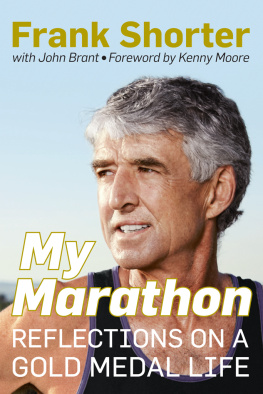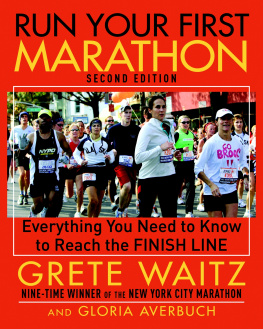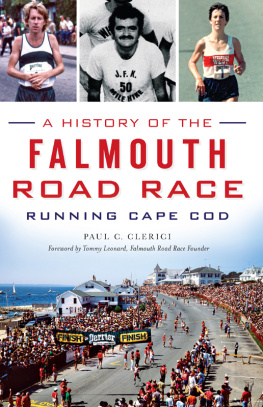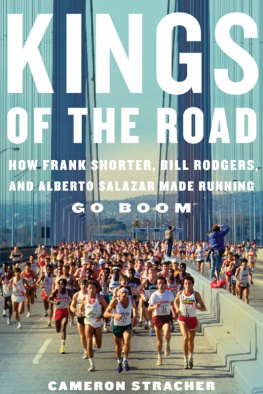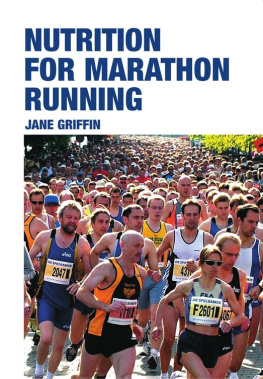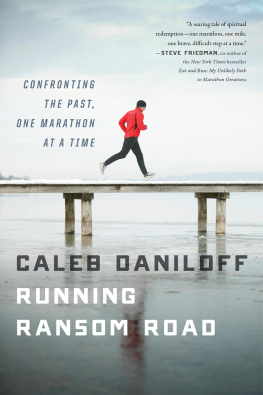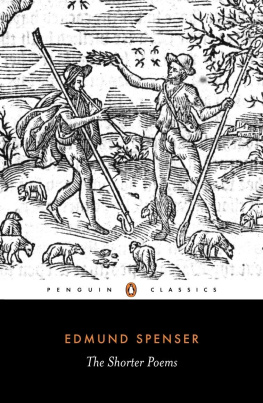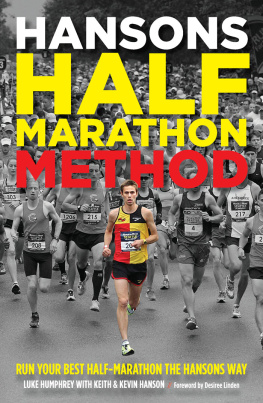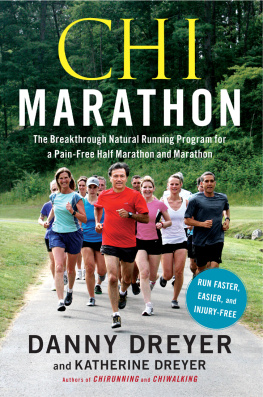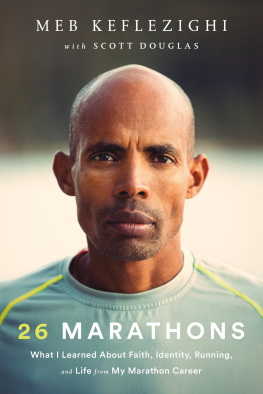Also by Frank Shorter
Olympic Gold (with Marc Bloom)
Frank Shorters Running for Peak Performance
Also by John Brant
Duel in the Sun
14 Minutes (with Alberto Salazar)

Mention of specific companies, organizations, or authorities in this book does not imply endorsement by the author or publisher, nor does mention of specific companies, organizations, or authorities imply that they endorse this book, its author, or the publisher.
Internet addresses and telephone numbers given in this book were accurate at the time it went to press.
2016 by Frank Shorter and John Brant
All rights reserved. No part of this publication may be reproduced or transmitted in any form or by any means, electronic or mechanical, including photocopying, recording, or any other information storage and retrieval system, without the written permission of the publisher.
Book design by Joanna Williams
Library of Congress Cataloging-in-Publication Data
ISBN-13: 9781623367244 paperback
ISBN-13: 9781623367251 e-book

We inspire health, healing, happiness, and love in the world. Starting with you.
RodaleWellness.com
To my brother Christopher John Shorter
19542015

Contents
Foreword
If ever there were a soul born and raised to cry out against injustice, it is Frank Shorter. If ever there were a soul who could completely channel his suffering into performance, it is Frank Shorter. If ever there were a soul who transformed his fame into unrelenting service to his nation, his sport, and humanity, it is Frank Shorter.
And if ever there were a soul who deserved to find peace, a peace beyond understanding, it is Frank Shorter.
In this brave book, he shows us that he finally has.
Frank has never been anything but brave. Four days after the massacre of eleven Israeli athletes at the 1972 Munich Olympics, Frank led me and Jack Bacheler to the start of the marathon. We were determined to show that barbarism only makes Olympians stronger. Our answer to the attack was to compress our anger and grief into our racing.
This is as scared as I get, he said. Now, lets go run.
Lord, did we run. Of course Frank won, I took fourth, and Jack ninth. That was the best finish by three runners from a single nation in history.
Franks victory was so compelling that it inspired a huge boom in American running. He became a proud father to it.
Not much later we lost a great friend. Frank had helped Steve Prefontaine plan a risky, AAU-unsanctioned tour of track meets in Oregon for athletes from Finland and raced him in his final race, a 5,000 meters on May 30, 1975.
Four days later, on Hayward Field, Bill Bowerman, Frank, and I gave eulogies for Pre.
Bowerman, his college and Olympic coach, began, Pres desire burned to be the best, and he was. Step by step, as he matured, he reached his goalsHe held every American record from 2,000 meters, two miles, through six miles and 10,000 meters. In 1976, his goal was Olympic champion and the world records related thereto.
Bowerman stopped and composed himself. He was the image of the wrongness of a father burying a son. I would never forget what he said next:
He also burned with another great goal: Emancipation! Freedom for the US athlete... In the history of our sport, no one man had ever been permitted to bring a foreign athlete or team to the USA. The door was always locked by national red tape and dictatorship. Pre opened the door by persistence and difficult communication. You saw the Finnish athletes. Theirs was the first such visit this century
I pledge to Pre and call on everyone to join me. We invite all true sportsmen to fulfill his great dream, freedom to meet in international sport and friendship.
Afters Pres death and Bowermans call, Frank was instrumental in what became a drumbeat of emancipation.
The Amateur Athletic Act of 1978, which Frank (a founding member of the USOCs Olympic Athletes Advisory Council) supported with all his heart, broke up the AAU, renamed it the Athletics Congress (TAC) and ensured athletes and coaches the rights and voices they had long fought for.
But under international rules, we still couldnt accept prize money and remain eligible for the Olympics. So Frank joined our runners union, the Association of Road Racing Athletes, led by Don Kardong, whod finished fourth in the 1976 Olympic marathon. ARRA created a professional circuit around the country.
The first showdown race was the 1981 Cascade Run-Off 15-K in Portland, Oregon. Nike put up $50,000 in prizes. And it was Frank who conveyed the situation to TAC executive director Ollan Cassell: Our pro league would succeed, and every good runner would be in ARRA and not TAC. If TAC and the IAAF didnt want to be obsolete tomorrow, they had to accept a deal where runners got paid but were not banned as pros.
The mechanism Shorter proposed was the trust fund. Prize money could go into accounts that TAC could monitor and say athletes were being paid for training expenses. Cassells acceptance of that deal ended a century of archaic amateurism.
We were free, free at last, to earn a living from running.
In 1976, Frank took the silver medal in the Montreal Olympic marathon, beaten by the unbelievably fresh Waldemar Cierpinski of East Germany. The memory moved Frank to become the first head of the United States Anti Doping Agency. And when the Stasi files were later unearthed, Cierpinskis name was listed prominent among the dopers.
By speaking out on behalf of honest athletes who didnt have a platform and by establishing the framework for USADA, Frank writes, I had done my best to lay that ghost to rest. I suspected that, for his part, Waldemar Cierpinski had never stopped looking back over his shoulder.
Franks tough runners psyche, his consistent training with the hardest intervals, his command of the pain of effort, all stemmed from the horrors of growing up in the family ruled by his father, in a 12-room house in Middletown, New York. Over the full arc of his life, he has contended every day with the damage his father did to him and his brothers and sisters.
My father, Samuel Shorter, MD, known to his devoted patients as Dr. Sam, he writes, lived an evil secret life in which he controlled his family through terror and out-of-control violence. It was so bad that I repressed most of his abuse and havent been able to lash it together into a coherent narrative. Instead, shards of my childhood surface spontaneously, like icebergs bobbing in a calm sea. The only time he spent around us was to afflict us.
Frank never told me. He never told his first wife, Louise.
In 2008, his father died, and Frank was flooded by relief. Gradually, things he had suppressed began coming back up.
In 2010, giving a talk to delinquent, abused kids, with Bill Rodgers and Dick Beardsley, fate was intervening, he writes, and it all poured out.
A little girl told him afterward that his story was her story, too.

